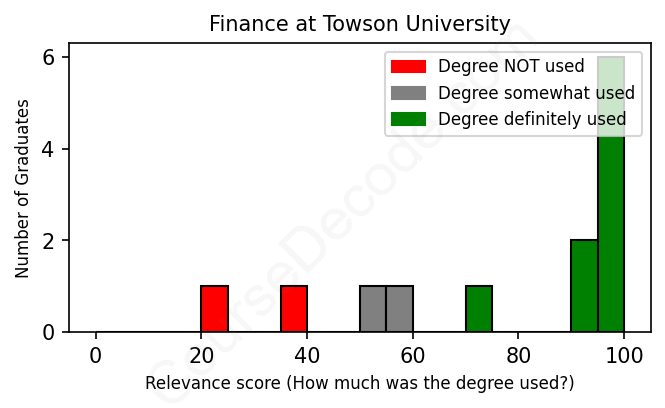
First, some facts. Of the Finance graduates from Towson University we've analyzed , here's how many have used (or NOT used) their degree in their career:

These are estimates based on AI analysis of 13 LinkedIn profiles (see below).
The verdict? Significantly above average. Overall, with an average relevance score of 78%, Finance graduates from Towson University have a much higher likelihood (+11%) of finding work in this field compared to the average graduate across all fields:
And for comparison, here's the chart for all profiles we've looked at across all degrees.
Also, after graduating, only 15% of these graduates have pursued further education other than another Bachelor's degree (such as a Masters degree or other), compared to the average across all profiles of 35%. This suggests a Bachelors degree is enough for most Finance graduates, and it's normal to look for work straight after graduation.
See the details:
|
Relevance score: 100% We think this person has gone into a career highly relevant to their degree. We think this person has gone into a career highly relevant to their degree.
DEGREE INFOGraduated in 2016 from Towson University with a Bachelor's degree in Finance. No other secondary education since. JOB HISTORY SINCE GRADUATIONBudget Analyst Johns Hopkins School of Medicine Jun 2016 - Jan 2018 Financial Analyst - JHM Budgets & Analyses  Johns Hopkins Medicine Jan 2018 - Jun 2019 Financial Healthcare Consultant  Breslin, Young & Slaughter, LLC Jun 2019 - Present ABOUTNo information provided. |
The top 10 most common jobs done by the graduates we've analyzed (ranked most common to least) are:
Here is a visual representation of the most common words in job titles for Finance graduates (this is across all Finance graduates we've analyzed, not just those who went to Towson University):

The graduates from Towson University who studied Finance generally appear to follow promising career paths, particularly in the financial services sector. For many of them, their first jobs after graduation frequently involve roles such as financial analysts, business bankers, or positions in financial planning. These entry-level roles often set the stage for more specialized positions in the finance world, as seen with graduates moving into positions like credit analysts, market leaders, and even directors in client development. It looks like a solid start for recent grads, giving them substantial exposure to important financial functions and helping them build relevant skills early in their careers.
As time goes on, say 5 to 10 years after graduating, many of these individuals tend to climb the corporate ladder. For instance, some have taken on leadership roles within established firms or moved into director-level positions, indicating a strong trend toward career advancement in relevant financial sectors. While a few graduates have navigated through varied roles or even ventured into entrepreneurship, the majority seem to stay rooted in finance-related careers, suggesting that a degree from Towson is a solid foundation for building a successful future in this field. Overall, it appears that Towson Finance grads are generally doing quite well for themselves in their careers, particularly in finance and related industries.
Honestly, a Bachelor’s degree in Finance can be a mixed bag when it comes to difficulty. At Towson University, you’ll dig into a bunch of numbers, theories, and practical applications, which can get pretty intense. Some classes might feel manageable, especially if you're good with math and enjoy problem-solving, but others, like advanced financial analysis or investment courses, can definitely challenge you. It’s not exactly a walk in the park, but it's also not the hardest degree out there—kind of average in terms of the effort you’ll need to put in. Just be ready for some late nights studying and plenty of group projects!
Most commonly, in the LinkedIn profiles we've looked at, it takes people 4 years to finish a Bachelor degree in Finance.
So, looking at these finance grads from Towson University, it seems like they're generally doing pretty well in their careers, especially compared to what you might expect for typical first jobs. The ones who graduated a while ago, like in 2013 and 2014, have moved up to relatively high positions with titles like Assistant Vice President and Director, which usually come with decent pay. Even those with more recent degrees are climbing the ladder quickly, landing roles at reputable companies like Morgan Stanley and becoming financial advisors, which can also lead to solid incomes over time. Of course, some are just starting out and might not be making the big bucks yet, but overall, it looks like many of these folks have found their way to decent salaries and have some promising career paths ahead of them!
Here is a visual representation of the most common words seen in the "about" section of LinkedIn profiles who have a Bachelor degree in Finance (this is across all Finance graduates we've analyzed, not just those who went to Towson University). This may or may not be useful:

Here are all colleges offering a Bachelor degree in Finance (ordered by the average relevance score of their Finance graduates, best to worst) where we have analyzed at least 10 of their graduates: